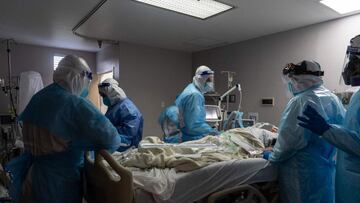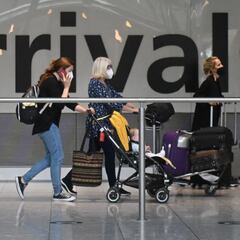Coronavirus US: Why is a Covid-19 surge team being sent to Missouri?
Hospital beds are filling up in Missouri. To support local officials, the federal government is sending in a surge response team to slow the spread.


The delta variant is quickly becoming the dominant strain of covid-19 in the United States. One of the states hardest hit is Missouri, where cases have doubled in the last month.
On 3 June, the state reported 516 new covid-19 cases, and by 4 July, that number was 1,108. Case numbers this high have not been seen since February. In response, state officials requested help from the federal government, which will be sending a covid-19 surge team.
⚠️It's beginning. Patients in southwest #Missouri are starting to be transferred to other hospitals, hundreds of miles away, as hospitals become filled with COVID patients. Only 38% of #Missouri is fully vaccinated & #DeltaVariant infections are surging. https://t.co/eBqwaD4qOx pic.twitter.com/iAKN8jLIe2
— Cleavon MD 💉 💉 💉 (@Cleavon_MD) June 30, 2021
Adding to this increase in cases is the low vaccination rate in the state. Nationally the average of partially vaccinated adults stands at sixty-seven percent; in Missouri, that rate is more than ten points lower. Nationally, around fifty-eight percent of the population is fully vaccinated, and in Missouri, the number is under fifty percent.
Dr. Anthony Fauci highlighted the risk unvaccinated Americans are taking on Meet the Press this Sunday. Fauci cited a new study that found that in June, 99.2% of those who died from covid-19 were unvaccinated. Fauci, who has been at the front lines of fighting this pandemic since last spring, described the deaths as “avoidable and preventable."
Covid-19 Surge Response Team arrives in Missouri
The heart of the outbreak is in the Southwest corner of the state. The Kansas City Star has also reported that not a single county has a fully vaccinated population above thirty-five percent.
The increased transmission of the delta variant has led hospitals to fill up quickly, with one, Mercy Hospital Springfield, running out of ventilators on the Fourth of July. Luckily, neighboring states are not experiencing the same rise in cases and have sent over the needed supplies.
A federal covid-19 surge response team is being sent to Missouri to combat the quick rise in cases and hospitalizations.
On 7 July, a CDC epidemiologist arrived in Springfield with another expert on the way, according to the White House. The team will work with local and state officials to increase testing and vaccination.
In an interview with Star, Dr. Cameroon Webb, a White House covid-19 policy expert, said that “There’s no one-size-fits-all with this pandemic," adding that his team is aware that the actions taken by the surge team will vary by location." One of the tactics being tossed around is “door-to-door promotion of the vaccine.”
However, a tweet sent by Governor Mike Parsons, a Republican, read that he had “directed our health department to let the federal government know that sending government employees or agents door-to-door to compel vaccination would NOT be an effective OR a welcome strategy in Missouri!” The governor followed up the initial tweet, sharing photos of him and his wife receiving the vaccine.
I have directed our health department to let the federal government know that sending government employees or agents door-to-door to compel vaccination would NOT be an effective OR a welcome strategy in Missouri!
— Governor Mike Parson (@GovParsonMO) July 8, 2021
What services do Covid-19 Surge Response teams provide?
During a press briefing by the White House Covid-19 Response Team on 1 July, the group’s coordinator Jeff Zients described a new federal government program to help states and municipalities fight covid-19.
Groups of health experts, or Surge Response Teams, will provide additional testing support to decrease the test positivity rate. This expansion will allow for the increased “detection of the virus and allow public health authorities to do contact tracing to help contain outbreaks.”
The Surge Response Teams will also help treat covid-19 patients as hospital beds fill up and health care staff is stretched thin. This additional and targeted support helps keep nurses, doctors, and other professionals free to treat non-covid patients, decreasing excess death.
Related stories
The teams will also “where needed and where requested to address gaps and augment local staff supporting vaccination, testing, and therapeutics work.” Increasing vaccination is one of the most critical responsibilities of the response teams as many are and will be sent to places where the vaccination rate is lower.
Lastly, these teams include CDC technical experts who will “help communities experiencing or at risk for becoming hotspots with containment, including assisting with epidemiology, data analysis, field investigations, and other public health response work.”

